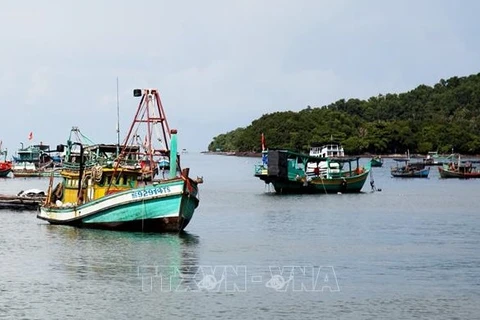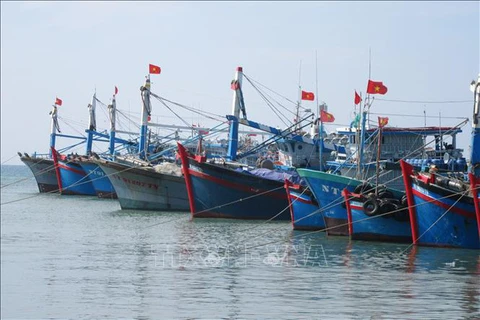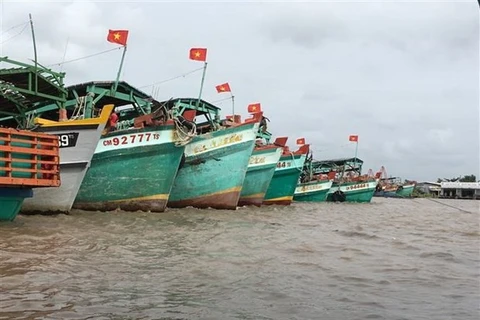Hanoi (VNA) – Vietnam still has a lot of things to do to have the European Commission (EC)’s ‘yellow card’ warning on Vietnamese seafood removed, according to Standing Vice President of the Vietnam Fisheries Society (VINAFIS) Nguyen Chu Hoi.
Hoi said that right after the EC’s issuance of its warning in late 2017, the Vietnamese Government identified this as an extremely serious problem and mobilised the entire political system to get involved in.
In particular, for the first time, the country immediately included 14 regulations on the identification of illegal, unregulated and unreported (IUU) fishing into its revised Law on Fisheries 2017.
After five years, the awareness on IUU fishing of all-level authorities and sectors and fishermen has been improved, production stabilised, and vessel monitoring systems (VMS) installed on almost all offshore fishing boats, stated Hoi.
According to him, the four criteria recommended by the EC, which Vietnam has yet to complete, are related to the nature of Vietnamese fisheries, as local fishermen are familiar to small business. Therefore, it needs time to change their habits.
To address the IUU fishing problem, the State should maintain and even step up the implementation of related policies, he said, adding that for the fisheries in general, there are three very important issues that need to be solved concertedly: fishery - fishery economy; fishing grounds – conservation of the nature, protection of resources and the marine environment for the survival of fish; and fishermen.
He also stressed the need to take specific actions to protect resources and maintain a good marine environment.
All efforts of fishermen will be meaningless and the achievements they gain may also be wiped away if the marine environment continues to be bad and poisoned, he noted.
The VINAFIS Vice President also emphasised the need to have a resolution to concertedly solve three issues related to fishermen, fisheries and fishing grounds to fight IUU fishing.
It is also necessary to adjust the strategy of prioritising marine farming, and expand the application of high technology in this work to reduce pressure on fishery exploitation because fish resources are dwindling and fish stocks decreasing as well, but the number of boats is still high, he added./.
Hoi said that right after the EC’s issuance of its warning in late 2017, the Vietnamese Government identified this as an extremely serious problem and mobilised the entire political system to get involved in.
In particular, for the first time, the country immediately included 14 regulations on the identification of illegal, unregulated and unreported (IUU) fishing into its revised Law on Fisheries 2017.
After five years, the awareness on IUU fishing of all-level authorities and sectors and fishermen has been improved, production stabilised, and vessel monitoring systems (VMS) installed on almost all offshore fishing boats, stated Hoi.
According to him, the four criteria recommended by the EC, which Vietnam has yet to complete, are related to the nature of Vietnamese fisheries, as local fishermen are familiar to small business. Therefore, it needs time to change their habits.
To address the IUU fishing problem, the State should maintain and even step up the implementation of related policies, he said, adding that for the fisheries in general, there are three very important issues that need to be solved concertedly: fishery - fishery economy; fishing grounds – conservation of the nature, protection of resources and the marine environment for the survival of fish; and fishermen.
He also stressed the need to take specific actions to protect resources and maintain a good marine environment.
All efforts of fishermen will be meaningless and the achievements they gain may also be wiped away if the marine environment continues to be bad and poisoned, he noted.
The VINAFIS Vice President also emphasised the need to have a resolution to concertedly solve three issues related to fishermen, fisheries and fishing grounds to fight IUU fishing.
It is also necessary to adjust the strategy of prioritising marine farming, and expand the application of high technology in this work to reduce pressure on fishery exploitation because fish resources are dwindling and fish stocks decreasing as well, but the number of boats is still high, he added./.
VNA

























